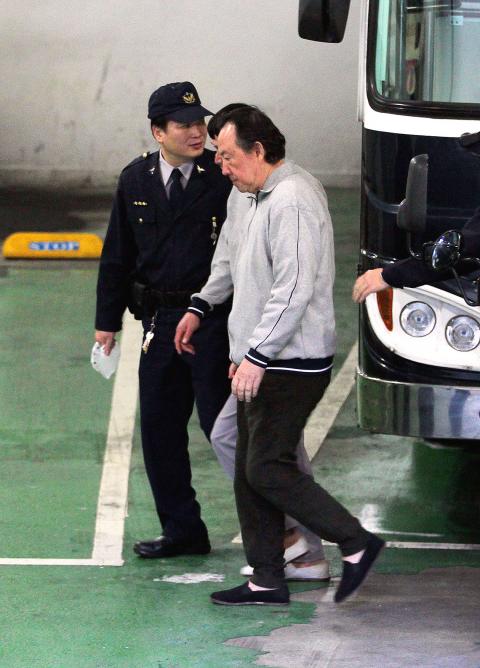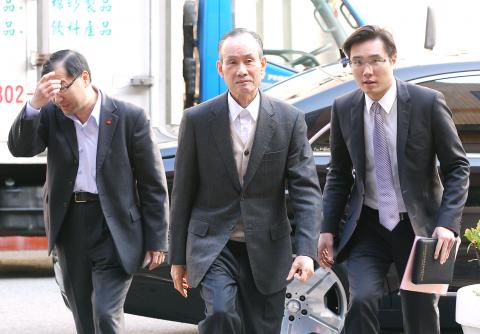The corruption trial of former Taoyuan county deputy commissioner Yeh Shi-wen (葉世文) wrapped up yesterday with the Taipei District Prosecutors’ Office asking for a 61-year prison sentence and a fine of NT$30 million (US$946,800).
Prosecutors asked for a nine-year term and NT$500,000 fine for Yeh’s alleged accomplice, Farglory Land Development Co (遠雄建設) chairman Chao Teng-hsiung (趙藤雄), who was indicted on bribery-related charges.
The Taipei District Court is scheduled to deliver its verdict on March 20.

Photo: CNA
Yeh and Chao’s fellow defendants are former National Taipei University of Technology professor Tsai Jen-jui (蔡仁惠), former Farglory vice president Wei Chun-hsiung (魏春雄) and a female friend of Yeh’s, Chen Li-ling (陳麗玲), who were charged with bribery and corruption.
The trial centered on several developments in the now Greater Taoyuan — some affordable housing projects in Bade (八德), an affordable housing project next to the A7 MRT station of Taiwan Taoyuan International Airport and the Danhai New Town project.
Yeh also faced a charge of unverifiable sources of income, as amendments to the Anti-Corruption Act (貪污治罪條例) in 2011 stipulated that civil servants, their spouses and children had legal responsibility to explain in full if their assets or wealth saw an unreasonable increase, when compared with their income, within three years of being suspected of violating the act.

Photo: CNA
Failure to provide an explanation or speak the truth is punishable by up to five years in prison, or a fine.
During the trial, Yeh had admitted accepting bribes in connection with the Bade projects and to having unverifiable income, but denied the other charges.
Yeh said that he took the bribes for the A7 project after Tsai, the alleged go-between, brought him NT$4 million, but he said that he had not asked for the money.
He said he regretted taking NT$16 million linked to the Bade project and asked the court to hand down a light sentence, adding that he hoped to be allowed to post bail so he could return home for the Lunar New Year holiday.
Chao has denied all charges against him and said that he was the “victim” in the case.
His lawyer criticized Tsai, who appeared as a state witness in court, and said Tsai’s confession and testimony were paradoxical and illogical, adding that Chao had been afraid of getting on Yeh’s bad side and was forced to give Yeh money.
Tsai said he had only acted as an intermediary, transferring money between all the parties. He said that after being detained last year, he had decided to admit his crimes and tell the truth.
Tsai’s lawyer, Fu Tzu-sheng (傅祖聲), said that his client, who was educated in the University of Tokyo and holds a doctorate in architecture from a US university, was the only defendant with a higher education and that Farglory’s many “green” buildings owed a debt to Tsai’s contributions.
Tsai was like an artist and his emotions often won over his rational side, Fu said, adding that his client did not have a clear grasp of time, which led to differing accounts of time in his testimony.
Fu said he hoped that the other defense attorneys in the trial case would not seek to trample Tsai’s integrity and character in their efforts to prove the innocence of their own clients.
Wei and Chen have denied all charges against them.
Additional reporting by CNA

The CIA has a message for Chinese government officials worried about their place in Chinese President Xi Jinping’s (習近平) government: Come work with us. The agency released two Mandarin-language videos on social media on Thursday inviting disgruntled officials to contact the CIA. The recruitment videos posted on YouTube and X racked up more than 5 million views combined in their first day. The outreach comes as CIA Director John Ratcliffe has vowed to boost the agency’s use of intelligence from human sources and its focus on China, which has recently targeted US officials with its own espionage operations. The videos are “aimed at

STEADFAST FRIEND: The bills encourage increased Taiwan-US engagement and address China’s distortion of UN Resolution 2758 to isolate Taiwan internationally The Presidential Office yesterday thanked the US House of Representatives for unanimously passing two Taiwan-related bills highlighting its solid support for Taiwan’s democracy and global participation, and for deepening bilateral relations. One of the bills, the Taiwan Assurance Implementation Act, requires the US Department of State to periodically review its guidelines for engagement with Taiwan, and report to the US Congress on the guidelines and plans to lift self-imposed limitations on US-Taiwan engagement. The other bill is the Taiwan International Solidarity Act, which clarifies that UN Resolution 2758 does not address the issue of the representation of Taiwan or its people in

US Indo-Pacific Commander Admiral Samuel Paparo on Friday expressed concern over the rate at which China is diversifying its military exercises, the Financial Times (FT) reported on Saturday. “The rates of change on the depth and breadth of their exercises is the one non-linear effect that I’ve seen in the last year that wakes me up at night or keeps me up at night,” Paparo was quoted by FT as saying while attending the annual Sedona Forum at the McCain Institute in Arizona. Paparo also expressed concern over the speed with which China was expanding its military. While the US

SHIFT: Taiwan’s better-than-expected first-quarter GDP and signs of weakness in the US have driven global capital back to emerging markets, the central bank head said The central bank yesterday blamed market speculation for the steep rise in the local currency, and urged exporters and financial institutions to stay calm and stop panic sell-offs to avoid hurting their own profitability. The nation’s top monetary policymaker said that it would step in, if necessary, to maintain order and stability in the foreign exchange market. The remarks came as the NT dollar yesterday closed up NT$0.919 to NT$30.145 against the US dollar in Taipei trading, after rising as high as NT$29.59 in intraday trading. The local currency has surged 5.85 percent against the greenback over the past two sessions, central